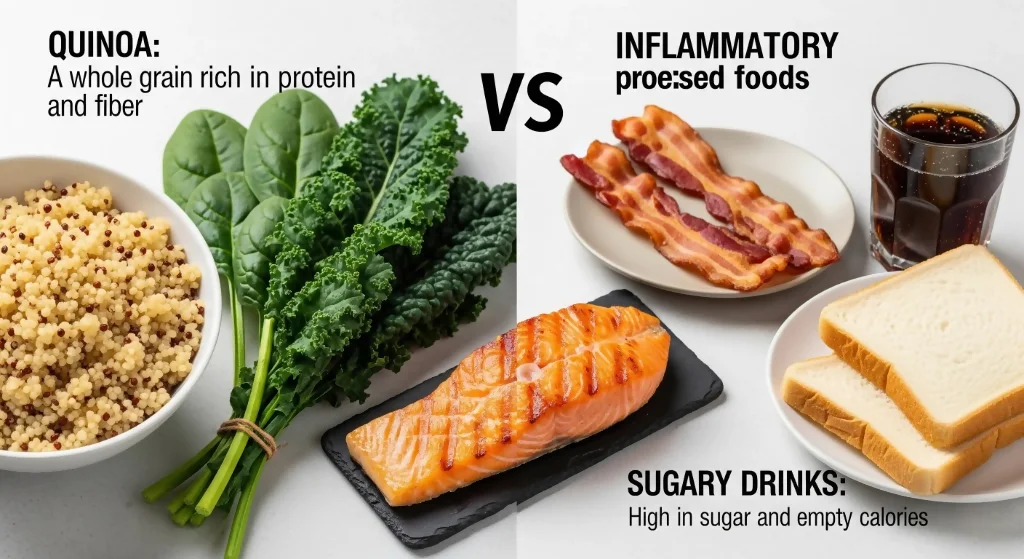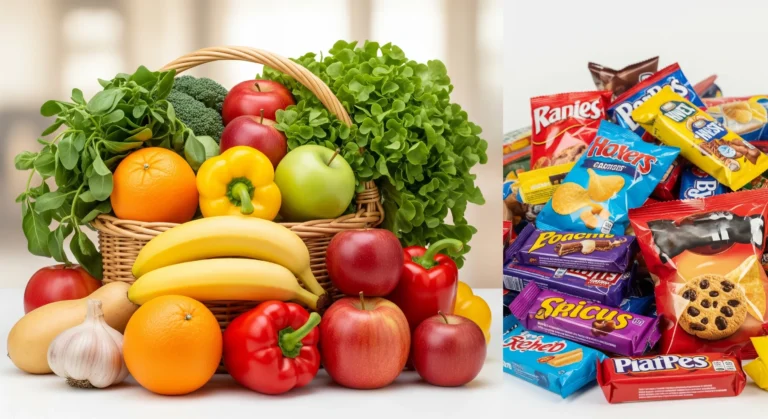High Protein Anti-Inflammatory Diet: 3 Foods to Eat and 3 to Avoid

Introduction
Anti-Inflammatory Diet High in Protein: 3 Foods to Eat and 3 Foods to Avoid
Chronic inflammation is related to severe health problems such as heart disease, obesity, arthritis, and even depression. While there are many solutions, one of the best solutions to fight chronic inflammation is through diet, specifically a high protein anti-inflammatory diet. There are several food items that can help reduce inflammation while supporting muscle building, weight management, and overall health.
In this guide, you will learn 3 incredible high-protein food options that will reduce inflammation, and 3 common food options that should be avoided because they trigger inflammation. If you are new to clean eating, or if you would like your current diet to improve, this post will always provide you with real, evidence-based, act-now tips to fight chronic inflammation.
1. What is a High Protein Anti-Inflammatory Diet?
A high protein anti-inflammatory diet reduces foods that contribute to chronic inflammation while increasing protein foods that repair and rebuild tissues. Protein is essential for wound healing, bodily function, immune functioning, and muscle preservation of mass preservation as we get older.
Not all proteins are equal, however. For instance, processed meats can be loaded with protein but also linked to inflammation and disease. The best option is lean, clean protein from whole food sources such as fish, legumes, eggs, and poultry.
A 2021 study published in Nutrients reported that diets high in lean proteins and anti-inflammatory fats (like omega-3s) resulted in significant reductions in biomarkers of inflammation in the body [source].
When you follow this plan, not only do you support your body’s natural healing process, but you also support your energy, mood, and vitality.
2. Eat This: Salmon – A Superfood for Inflammation
Salmon is one of the best proteins for inflammation, and it’s high in omega-3 fatty acids, which help block inflammatory cytokines. Just two servings of fatty fish (such as salmon) each week can significantly reduce your risk of heart disease, and reduce symptoms associated with arthritis and autoimmune diseases.
Why It Works:
- A great source of omega-3s (EPA and DHA)
- Contains vitamin D and B vitamins
- A high-quality protein (about 22g per 3 oz)
How You Can Enjoy It:
- Grill or bake with olive oil and lemon
- Use in salads, rice bowls, or tacos
- Use a can of salmon on those busy nights
If salmon is something you want to include as a part of a natural health reset, I encourage you to look into pairing it with a natural supplement such as this trusted health supplement for total body support.

3. Eat This: Lentils – Plant-Based Protein Power & Anti-Inflammatory
Lentils are an excellent source of plant-based source of protein and fiber. They are a good source of polyphenols, which are antioxidants that help reduce oxidative stress inside our bodies as a result of inflammation.
Some benefits of lentils include:
- High protein levels (18g protein per cup cooked)
- High fiber, which helps with your gut health and digestion
- High in iron, folate, and magnesium
- Affordable and shelf-stable
Ways to use lentils:
- Include in soups, curries, or salads
- Make lentil patties and burgers
- Combine with turmeric and garlic for additional Protein Anti-Inflammatory Diet support.
Lentils are also a great option for individuals transitioning to a plant-based lifestyle. You can read all about how plant-based diets compare to keto in this guide.
4. Eat This: Eggs – Nutrient-Rich and Protein-Packed
Eggs can get a bad rap, but they are a solid source of complete, high-protein, Anti-Inflammatory Diet nutrients. The yolk contains choline, which impacts brain health and can reduce inflammation.
Why Eggs Are Anti-Inflammatory:
- High-quality protein source (6g per egg)
- Vitamins A, D, B12, selenium
- Contains antioxidants like lutein and zeaxanthin
- Easy to prepare, versatile
Healthy Ways to Eat Eggs:
- Scrambled with spinach and mushrooms
- Boiled and added to salads
- Poached atop quinoa or avocado toast
If you are an athlete, dieter, or need extra energy, feel free to enjoy eggs as part of a breakfast with your natural supplements like these metabolism boosters.

5. Don’t Eat This: Processed Meats – Inflammation in Every Bite
Bacon, sausage, deli meats, and hot dogs are quick and easy, but they’re also very damaging to you. They are highly processed and often treated with preservatives like nitrates, sodium, and artificial flavors — many of which have been shown to increase inflammation and chronic disease.
Why Processed Meats Are Damaging:
- Increased risks of heart disease, cancer, and diabetes
- High saturated fats and sodium
- Can increase inflammatory markers like CRP (C-reactive protein)
Healthier Alternatives:
- Choose lean turkey or chicken breast
- Substitute with tofu or tempeh as plant-based options
- Home-cooked fresh meats with anti-inflammatory spices
In the interest of your health and keeping inflammatory markers to a minimum, you should reduce or completely eliminate processed meats.
6. Avoid This: Refined Carbohydrates – Sneaky Inflammation Provocateurs.
Refined carbs, including white bread, pastries, pasta, and sugar-laden cereal, are highly inflammatory because they cause extreme blood sugar swings. Blood sugar increase results in elevated insulin levels, and that results in inflammatory responses.
Refined Carbohydrates to Avoid:
- White rice
- Bakery goods made with white flour
- Sweetened breakfast cereals
- Snack bar packaged snacks
How to Replace Them:
- Switch to whole grains (quinoa, brown rice, and oats)
- Choose high-protein snacks (Greek yogurt, nuts, or hummus)
- Use almond or coconut flour instead of wheat flour for baking.
Whole grains help with gut health and provide more long-lasting energy vs. short-lasting energy complex carbs that take you on highs and subsequent crashes while increasing cravings.
7. Avoid This: Sugary Drinks – Liquid Inflammation
Sugary drinks, including soda and fruit punch, and energy drinks, are well known to be some of the most powerful contributors to chronic inflammation. They are all high in fructose, which is rapidly absorbed, leading to insulin spikes and fat storage and, ultimately, inflammation.
Examples of Sugary Drinks Include:
- Regular soda
- Bottled iced tea with sugar
- Pre-made energy drinks
- Flavored “Coffee” drinks
Healthier Beverages:
- Water infused with lemon or cucumber
- Herbal teas (ginger, green tea, turmeric)
- Plain almond or oat milk
Transitioning to anti-inflammatory drinks can help decrease bloating, brain fog, and joint pain.
Frequently Asked Questions (FAQ)
Q1: Can I do a high-protein anti-inflammatory diet in a vegetarian way?
Absolutely! You can include beans, lentils, quinoa, tofu, and chia seeds as plant-based protein sources. These are good examples of anti-inflammatory foods that are also rich in protein.
Q2: How quickly will I see results from my anti-inflammatory diet?
People generally report decreased bloating, improved digestion, and more energy within the first 1–2 weeks. Other noticeable benefits, like decreased joint pain or improved focus, may take 3–6 weeks.
Q3: Can I eat carbs on a high-protein, anti-inflammatory Diet?
Sure, but make sure to eat mostly complex carbohydrates, like oats, quinoa, sweet potatoes, and brown rice. Refined and processed carbs will lead to inflammation, so try to avoid them.

Conclusion:
small shifts in your diet, big shifts in anti-inflammatory benefits
The foods you put in your body play a huge role in your body’s ability to combat inflammation and stay healthy. By adopting a high-protein anti-inflammatory diet, you’re providing your body with the fuel it needs to heal, energize, and thrive.
Begin by adding salmon, lentils, and eggs to your meals while avoiding processed meats, refined carbohydrates, and sugary drinks. Small changes can lead to large health benefits. High Protein Anti-Inflammatory Diet
And, if you’d like to have a little extra help in your wellness journey, check out these trusted natural health supplements to increase your wellness success:
👉 Whole-body health
👉 Energy and fat metabolism boosters






